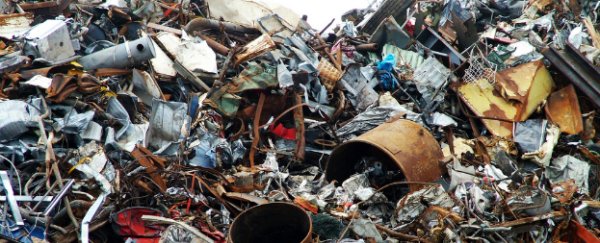Plastic is notoriously difficult to get rid of - it's toxic to melt or burn and when left to its own devices in landfill, can hang around for hundreds of years.
Now scientists have developed a new type of plastic that breaks down upon exposure to light, and, impressively, degrades fully within just three hours.
To make the plastics, the researchers from North Dakota State University in the US created a solution from fructose, a sugar found in fruit, and molecules that can absorb light known as phototriggers. They then heated this solution to make long, repeating chains that formed solid, pale brown plastic when cooled.
As soon as this plastic was exposed to ultraviolet light at 350 nanometres wavelength (the Sun gives off light ranging from around 290 nanometres to 3,200 nonametres) the light-absorbing molecules broke off from the chains and the plastics started to degrad.
"In a proof-of-concept experiment, the new plastics dissolved into a clear solution after being exposed to ultraviolet light for three hours, indicating that they were completely reduced to their soluble building-block molecules," writes XiaoZhi Lim for Science.
These building blocks can then be fully recovered and recycled to make new plastic. The results have been published in Angewandte Chemie.
Of course, plastic that starts to recycle itself as soon as it's exposed to sunlight isn't going to be very practical for many uses, but in particular products, such as electronics, the new material could greatly help to reduce our impact on the environment.
More research is now needed to work out how this plastic compares to other plastics in terms of durability and strength.
Source: Science
